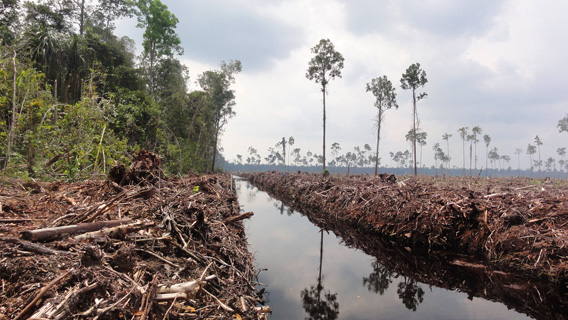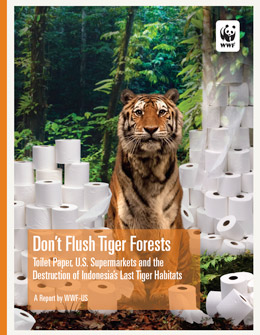- Beleaguered paper giant Asia Pulp & Paper was sharply criticized Wednesday for its claims that its operations are certified sustainable by independent auditors.
- WWF said its survey of certifiers and certification schemes shows that none apply to ‘the most controversial operations’ of APP’s suppliers: clearing of rainforests and peatlands that are home to endangered tigers, elephants, and orangutans.
- In responding to complaints from environmentalists that its operations are responsible for large-scale destruction of native forests, APP often touts various certification standards which it says demonstrate its commitment to sustainability.

Peat draining and large-scale clearance of natural forest by APP wood supplier PT. Ruas Utama Jaya inside APP’s Senepis Tiger Sanctuary in June and October 2011. © Eyes of the Forest / WWF-Indonesia
Beleaguered paper giant Asia Pulp & Paper was sharply criticized Wednesday for its claims that its operations are certified sustainable by independent auditors. WWF said its survey of certifiers and certification schemes shows that none apply to “the most controversial operations” of APP’s suppliers: clearing of rainforests and peatlands that are home to endangered tigers, elephants, and orangutans.
“None of the certifiers are prepared to back APP’s claim that their certifications demonstrate its sustainability. This is another blow to the credibility of APP’s massive global greenwash campaign,” said WWF International forest program director Rod Taylor in a statement.
In responding to complaints from environmentalists that its operations are responsible for large-scale destruction of native forests, APP often touts various certification standards which it says demonstrate its commitment to sustainability. Yet the new WWF survey found that these standards don’t apply across all of the paper giant’s operations — APP’s suppliers in Indonesia continue to harvest and convert natural forests. Nor do the certification standards necessarily prove that APP’s forest management practices are “sustainable”, according to WWF:
-
WWF asked the nominated certification schemes and assessors whether they supported the APP claim and also asked for detail of what specific APP products or operations were covered by their certifications. The survey covered the key social and environmental measures of free prior and informed consent by landowners and protection of high conservation value forests for forest operations and forest clearance for plantations.”
None of the schemes or assessors endorsed the APP statement, with major certifier SGS noting that “None of the TLTV (legality) evaluations conducted by SGS and the statements issued by SGS provide the company with the right to claim that their operations are ‘sustainable forest management’ ” and “The SGS certificates/statements do not support the claim of ‘sustainability’.”
No certificate or assessment issued evaluated the sustainability of the APP group as a whole. The Indonesian voluntary certification scheme LEI said it “did not have data of all APP operations”.
Key but neglected dimensions of sustainability were whether conversion to plantation involved the clearing of High Conservation Value (HCV) forest or whether those with traditional forest rights or tenure had given their “free, prior and informed consent” to the conversions. The LEI standard, for example confirmed that “The decision to establish forest plantation in certain area, either it was converting natural forest with HCV forest or deep peat and how it was conducted in relation to Free, Prior and Informed Consent is beyond LEI’s standard coverage.”
 Don’t Flush Tiger Forests |
WWF also took on APP’s claims that its certifications prove it operates strictly within Indonesian law, noting that “none of the certifications demonstrated the legality of the APP wood supply as a whole.” It said APP’s conversion of deep peatlands for plantations was “legally contentious”.
WWF said the findings cast further doubt on APP’s stewardship of the environment, which it said was already in question due in part to its failure to fulfill past pledges to phase out sourcing of fiber from rainforest areas.
“No amount of public relations can change the fact that APP has bulldozed through their own 2004, 2007 and 2009 deadlines to stop feeding Sumatra’s natural forests through its pulp mills,” said Taylor. “Recent revelations that APP is developing the world’s biggest pulp mill in South Sumatra does not inspire any confidence of the company meeting its 2015 deadline for sustainable sourcing.”
For its part, APP denies it is developing the mill in South Sumatra, which it says “is in development by a plantation forest concession holder who currently supplies pulpwood to APP”.
Nevertheless, WWF says APP’s activities — no matter how APP portrays them — continue to threaten Sumatra’s increasingly rare native forests.
“APP’s claims of sustainability are not convincing to a host of major companies that have ceased to buy paper products from them,” said Taylor, adding that 13 out of the 20 companies listed in WWF’s report published last week have stopped buying APP’s Paseo brand products.
“APP should realize that performance, not promises and propaganda will get the world off its back. A key performance indicator would be for APP pulp mills to immediately halt all use of wood sourced by clearing tropical forests.”
Coordinates of forest being cleared by APP supplier PT. Ruas Utama Jaya.







